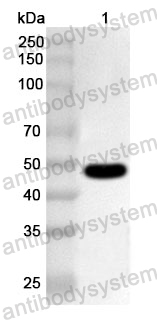Catalog No.
PHD79101
Species reactivity
Human
Host species
Rabbit
Isotype
IgG
Clonality
Polyclonal
Immunogen
E. coli - derived recombinant Human MSX1 (Ala2-Thr303).
Tested applications
ELISA: 1:4000-1:8000, IHC: 1:50-1:100, WB: 1:1000-1:4000
Target
Homeobox protein MSX-1, Homeobox protein Hox-7, Msh homeobox 1-like protein, MSX1, HOX7
Purification
Purified by antigen affinity column.
Accession
P28360
Applications
ELISA, IHC, WB
Form
Liquid
Storage buffer
0.01M PBS, pH 7.4, 50% Glycerol, 0.05% Proclin 300.
Stability and Storage
Use a manual defrost freezer and avoid repeated freeze thaw cycles. Store at 2 to 8°C for frequent use. Store at -20 to -80°C for twelve months from the date of receipt.
Expression of β-catenin and MSX1 proteins during parrot pseudoteeth and goose denticulations and giant filiform papillae's early development., PMID:39637682
Isolation and Identification of Limbal Niche Cells., PMID:37955381
Development of Potential Prognostic Biomarkers Based on DNA Methylation-Driven Genes for Patients with Endometrial Cancer., PMID:35002309
Phosphorylation of Msx1 promotes cell proliferation through the Fgf9/18-MAPK signaling pathway during embryonic limb development., PMID:33080014
New genetic findings in a large cohort of congenital hypogonadotropic hypogonadism., PMID:31200363
Growth factors FGF8 and FGF2 and their receptor FGFR1, transcriptional factors Msx-1 and MSX-2, and apoptotic factors p19 and RIP5 participate in the early human limb development., PMID:29409666
Nine Novel PAX9 Mutations and a Distinct Tooth Agenesis Genotype-Phenotype., PMID:28910570
Reduced homeobox protein MSX1 in human endometrial tissue is linked to infertility., PMID:27312535
Uterine inactivation of muscle segment homeobox (Msx) genes alters epithelial cell junction proteins during embryo implantation., PMID:26667042
Developmental stalling and organ-autonomous regulation of morphogenesis., PMID:22084104
Anterior Hox genes interact with components of the neural crest specification network to induce neural crest fates., PMID:21433221
Msx-1 is suppressed in bisphosphonate-exposed jaw bone analysis of bone turnover-related cell signalling after bisphosphonate treatment., PMID:21366807
Identification of direct downstream targets of Dlx5 during early inner ear development., PMID:21227998
Expression of Msx-1 is suppressed in bisphosphonate associated osteonecrosis related jaw tissue-etiopathology considerations respecting jaw developmental biology-related unique features., PMID:20942943
WNT11 expression is induced by estrogen-related receptor alpha and beta-catenin and acts in an autocrine manner to increase cancer cell migration., PMID:20870744
MTHFR and MSX1 contribute to the risk of nonsyndromic cleft lip/palate., PMID:20572854
BMP signaling in the human fetal ovary is developmentally regulated and promotes primordial germ cell apoptosis., PMID:20506112
Parathyroid hormone-related peptide (PTHrP), parathyroid hormone/parathyroid hormone-related peptide receptor 1 (PTHR1), and MSX1 protein are expressed in central and peripheral giant cell granulomas of the jaws., PMID:20060342
SOX15 and SOX7 differentially regulate the myogenic program in P19 cells., PMID:19489079
Transcription factor c-Myb is involved in the regulation of the epithelial-mesenchymal transition in the avian neural crest., PMID:16231084
SMAD 8 binding to mice Msx1 basal promoter is required for transcriptional activation., PMID:16101586
Msx1 expression in the adult mouse brain: characterization of populations of beta-galactosidase-positive cells in the hippocampus and fimbria., PMID:15312901
Msx1-deficient mice fail to form prosomere 1 derivatives, subcommissural organ, and posterior commissure and develop hydrocephalus., PMID:15217086
Msx1 disruption leads to diencephalon defects and hydrocephalus., PMID:15188430
Gene modulation by Cox-1 and Cox-2 specific inhibitors in human colorectal carcinoma cancer cells., PMID:14633654
Bone morphogenetic protein 4 mediates apoptosis of capillary endothelial cells during rat pupillary membrane regression., PMID:12808102
Msx3 protein recruits histone deacetylase to down-regulate the Msx1 promoter., PMID:11115394
Ectodermally derived FGF8 defines the maxillomandibular region in the early chick embryo: epithelial-mesenchymal interactions in the specification of the craniofacial ectomesenchyme., PMID:11087627
Molecular analysis of external genitalia formation: the role of fibroblast growth factor (Fgf) genes during genital tubercle formation., PMID:10804187
A minimal murine Msx-1 gene promoter. Organization of its cis-regulatory motifs and their role in transcriptional activation in cells in culture and in transgenic mice., PMID:9278425
Rapid identification of homeodomain binding sites in the Wnt-5a gene using an immunoprecipitation strategy., PMID:8858134
Ability of FGFs to promote the outgrowth and proliferation of limb mesoderm is dependent on IGF-I activity., PMID:8853995
Transcriptional control of the tissue-specific, developmentally regulated osteocalcin gene requires a binding motif for the Msx family of homeodomain proteins., PMID:7809141

